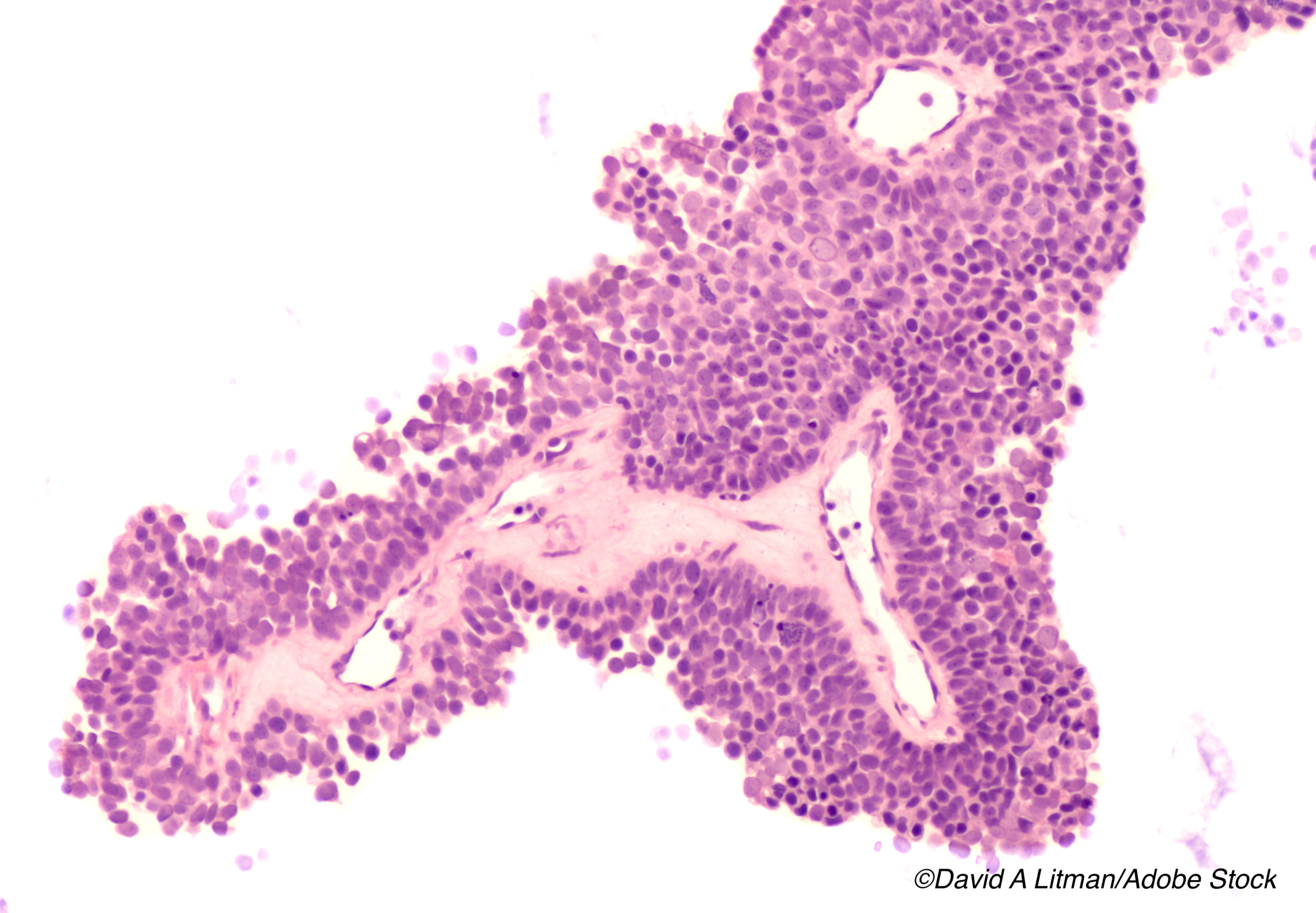
“There are limited and largely ineffective treatment options for patients who have disease progression after treatment with platinum chemotherapy and PD-1 or PD-L1 inhibitors,” Thomas Powles, MD, Barts Cancer Centre, Queen Mary University of London, and colleagues reported in the New England Journal of Medicine. They noted that enfortumab vedotin showed superior efficacy for this patient population who had previously received treatment with platinum-based chemotherapy and PD-1 or PD-L1 inhibitors.
As the authors explained, enfortumab vedotin is an antibody-drug conjugate that is directed against nectin-4, a cell-adhesion molecule that is highly expressed in urothelial cancer and which may contribute to tumor cell growth and proliferation.
In the study, Powles and colleagues reported that at a median follow-up of 11.1 months, the risk of death was 30% lower among patients treated with enfortumab vedotin compared with chemotherapy at a hazard ratio (HR) of 0.70 (95% CI, 0.56-0.89; P=0.001).
Median OS was 12.8 months (95% CI, 10.5-15.2 months) in the novel antibody-drug conjugate arm compared with a median of 8.9 months (95% CI, 8.0-10.7 months) among chemotherapy controls, the researchers wrote, and added that at 12 months, an estimated 51.1% (95% CI, 44.6-58%) of patients in the enfortumab vedotin group were still alive compared with 39.2% (95% CI, 32.6-45.6%) of those treated with chemotherapy.
Enfortumab vedotin was given at a dose of 1.25 mg/kg on days 1, 8, and 15 of a 28-day cycle while chemotherapy in the form of standard docetaxel, paclitaxel or vinflunine was given on day 1 of a 21-day cycle.
Evaluated as a secondary end point, “[t]reatment with enfortumab vedotin resulted in significantly longer progression-free survival [PFS] than chemotherapy and a 38% lower risk of progression or death,” at a HR of 0.62 (95% CI, 0.51-0.75; P<0.001), the investigators reported.
Median PFS was 5.5 months (95% CI, 5.3-5.8 months) in the antibody-conjugate arm compared with 3.7 months (95% CI, 3.5-3.9 months) in the chemotherapy arm.
As was true for OS, the observed PFS benefit with enfortumab vedotin compared with standard chemotherapy was seen across multiple subgroups, although not, interestingly enough, among female patients. However, since fewer than 23% of the study group consisted of women, this lack of benefit in women may not be a true lack of effect of the drug in females, the authors suggested.
The overall response rate (ORR), complete response (CR) and disease control rates were all superior in enfortumab vedotin-treated patients than among those who received chemotherapy, as the authors noted.
- ORR: 40.6% (95% CI, 34.9-46.5%) versus 17.9% (95% CI, 13.7-22.8%; P<0.001).
- CR: 4.9% versus 2.7%.
- Disease control: 71.9% (95% CI, 66.3-77%) versus 53.4% (95% CI, 47.5-59.2%).
In contrast, among patients who achieved either a CR or a partial response, the median duration of response was slightly longer in the chemotherapy arm at 8.1 months compared with 7.3 months for those treated with the antibody-conjugate agent.
Grade 3 or higher, treatment-related adverse events (AEs) occurred in equal proportions of patients at 51.4% of patients in the enfortumab vedotin group versus 49.8% of those in the chemotherapy group. Rates of AEs that resulted in dose reduction, interruption of treatment or treatment withdrawal were somewhat higher among enfortumab vedotin-treated patients at 32.4%, 51% and 13.5% of patients, respectively. These rates compared with 27.5%, 18.9% and 11.3% of chemotherapy-treated patients, respectively, the authors noted.
The most frequent treatment-related AEs of special interest among patients treated with enfortumab vedotin were skin reactions and peripheral neuropathy, with skin reactions frequently manifesting as a maculopapular rash that was likely related to nectin-4 expression in the skin. AEs that resulted in death occurred in 2.4% of the antibody-drug conjugate arm and in 1% of chemotherapy treated patients.
And given that maintenance treatment with at least one of the PD-L1 inhibitors has good evidence supporting its use, “enfortumab vedotin may be considered at the time of the first relapse after maintenance immunotherapy,” the authors proposed.
“The efficacy data from this trial suggest that enfortumab vedotin may play a role in the treatment of advanced urothelial carcinoma,” Powles and colleagues noted. “In light of recent data that support maintenance treatment with the PD-L1 inhibitor avelumab after platinum-containing chemotherapy for advanced urothelial carcinoma, enfortumab vedotin may be considered at the time of the first relapse after maintenance immunotherapy. Phase 2 data for enfortumab vedotin in combination with pembrolizumab as first-line treatment for metastatic disease have resulted in a Breakthrough Therapy designation from the Food and Drug Administration on the basis of high response rates and duration of response.” The study authors also added that there are ongoing clinical trials looking at regimens with enfortumab vedotin.
-
Enfortumab vedotin significantly prolonged overall survival compared with chemotherapy in previously treated advanced urothelial cancer following disease progression during or after PD-1 or PD-L1 inhibitor therapy.
-
Enfortumab vedotin is an antibody-drug conjugate that is directed against nectin-4, a cell-adhesion molecule that is highly expressed in urothelial cancer and which may contribute to tumor cell growth and proliferation.
Pam Harrison, Contributing Writer, BreakingMED™
The study was funded by Astellas Pharma US and Seagen.
Powles reported grants, personal fees and non-financial support from AstraZeneca , grants and personal fees from BMS, grants and personal fees from Exelixis, personal fees from Incyte , grants, personal fees and non-financial support from Ipsen , grants and personal fees from Merck , grants, personal fees and non-financial support from MSD, grants and personal fees from Novartis, grants, personal fees and non-financial support from Pfizer, grants and personal fees from Seattle Genetics, personal fees from Merck Serono, grants and personal fees from Astellas, grants and personal fees from Johnson & Johnson , grants and personal fees from Eisai , grants, personal fees and non-financial support from Roche , outside the submitted work.
Cat ID: 117
Topic ID: 78,117,730,117,120,451,935,191,192,925,450



Create Post
Twitter/X Preview
Logout